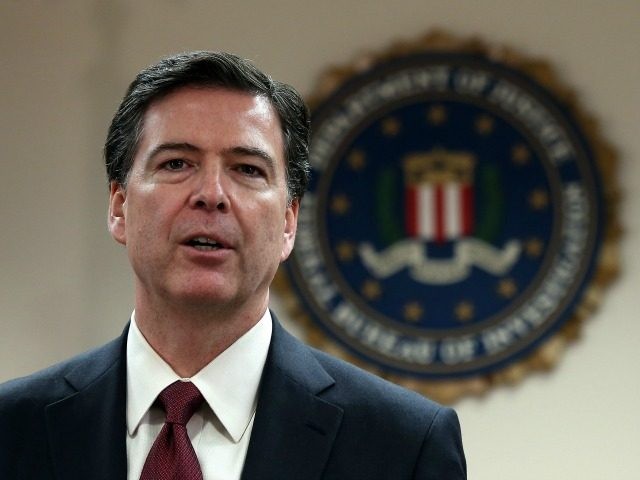The re-opening of an FBI investigation into Democratic presidential nominee Hillary Clinton’s use of email has launched an onslaught of criticism for FBI director James Comey.
Those who blame Comey for the move should look to Clinton, whose use of programs like BleachBit made a full FBI investigation impossible without the latest discoveries.
Director Comey created a political firestorm across America when he recently announced he would reopen the probe into Clinton’s use of an unauthorized, insecure, and offsite private server to store classified and unclassified emails the entire time she was Secretary of State (2009-2013) and nearly two years afterwards. It is important for Americans to understand the gravity of the scandal and its impact on U.S. national security.
During the course of its initial investigation (July 2015-July 2016) the FBI found, among other things, that over 2,000 of the emails stored in Secretary Clinton’s three unclassified servers were deemed to contain classified information ranging from Confidential, Secret to Top Secret and higher – including some that contained Top Secret/Sensitive Compartmentalized Information and some classified as Top Secret/Special Access Program information.
The legal framework for protecting classified information, as well as national security risks and applicable laws and penalties, is explained in Congressional Research Service Report RS21900. Applicable regulatory requirements for storing and safeguarding classified material appear in Foreign Affairs Manual 12 FAM 530. The CRS Report describes the degree of expected damage to U.S. national security occurring from unauthorized release of Confidential, Secret and Top Secret information as: damaging, seriously damaging, or gravely damaging.
The FBI could not develop a complete record of how many emails Clinton stored because the Secretary’s PRN archive had been permanently deleted with BleachBit, after the House Committee subpoenaed the emails. Investigators determined, however, that hostile actors could have gained access to Secretary Clinton’s personal e-mail account before the use of BleachBit.
The House Select Committee on Benghazi, through hearings and information requests, discovered Secretary Clinton’s use of a private server.
The private server enabled Secretary Clinton and others to avoid legitimate congressional oversight requests and Freedom of Information Act media requests for emails on such sensitive topics like the terrorist attack on U.S. missions in Benghazi and work she may have been doing on her family’s foundation.
But it also exposed the information stored in her server to cyber-hacking by hostile foreign enemies. She actually used several different servers and administrators of those servers during her four years at the State Department, and used numerous mobile devices to view and send e-mail on that personal domain, according to Director Comey.
Director Comey publicly discussed the FBI findings in July and concluded that, while Secretary Clinton and her staff were “extremely careless in their handling of very sensitive, highly classified information,” he would not recommend any charges be brought by the Justice Department and closed the case. In congressional testimony he subsequently admitted that some of Secretary Clinton’s numerous public statements about the “homebrewed” system were not truthful.
However, the case didn’t remain closed for long. In October, Director Comey reopened the investigation when FBI agents reportedly found some 650,000 emails stored in a computer and system shared by disgraced former Democrat U.S. Congressman Anthony Weiner and his estranged wife, long-time Secretary Clinton aide Huma Abedin. Government authorities expressed concern that the information stored in the Weiner/Abedin server may also contain classified information and may have been just as vulnerable to hostile intrusion by foreign agents as Secretary Clinton’s. The emails were reportedly discovered during an FBI investigation into Weiner’s alleged sexting messages with a 15-year-old girl.
Secretary Clinton, her political and media allies, and others immediately denounced Director Comey for reopening the case in the waning days of the presidential campaign. Just a few months earlier many of them heaped praise on him as the embodiment of integrity for closing the investigation – as many opposed to that decision railed against it.
The Secretary of State is the third highest ranking position in the U.S. Government’s Executive Branch following the President and Vice-President. The Secretary carries out the President’s foreign policies and participates as a key member of the President’s National Security Council, providing advice and assistance to the President on the most important and urgent foreign policies and national security matters. Therefore, the Secretary is an automatic target of those seeking to learn as much as possible about what is going on inside the highest levels of the U.S. Government through various forms of espionage activities.
As such, it is inexplicable why Secretary Clinton would engage in such risky national security behavior. She intentionally bypassed national security protocols in establishing and using a private email system that was vulnerable to hostile foreign cyber-hacking when a more secure server with encrypting capabilities was available at the State Department. In doing so, she may have allowed some of the nation’s most sensitive information to fall into the hands of enemies that could be used against the United States or for blackmail purposes against her or others.
In addition, she may have also violated a number of laws and regulations pertaining to storing and safeguarding of classified information. These are not credentials one running for the presidency should possess. And if anyone wants to blame someone for Secretary Clinton’s current email woes, they should start with her, not Director Comey.
Fred Gedrich is a foreign policy and national security analyst. He served in the U.S. departments of State and Defense.

COMMENTS
Please let us know if you're having issues with commenting.